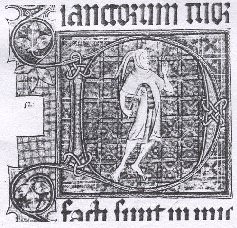Introduction: The personage of the Fool, also known as the Jester, is a universal phenomenon, that occurs in most cultures, with basic characteristics that transcend circumstantial particularities. Traditional fools played mirthful games with their court’s assumptions about reality, happily juggling lightheartedly with all meanings, values and norms of their respective societies. The popularized image of the Fool, one passed down from the medieval and early modern monarchs of Europe, is one of a humorous character with a bell-adorned coxcomb hat. This image may be identified easily today as, “The Joker,” who typically finds residence in the common pack of playing cards. Curiously, while elements of this symbol and its legacy play a role that parallels the Fool of Irish tradition, there are distinct differences.
In this essay, I shall describe the dynamic between king and jester, clarifying the distinctly different roles between Jester and poet in Irish tradition, and outlining the Jester’s heritage as someone whose role is sacrificial—for all the jesters in the literature culminate in sacrifice for their king. The costume of the Jester shall be seen to have close resemblance to the sacrificial garments of ancient rituals. I shall give two examples of the Fool being sacrificed to represent the folly of his liege, namely Mac Glass in How Rónán Killed His Son, and Úa Maigleine in The Battle of Allen. Afterwards I will outline how cards themselves are closely linked to the Jester and the action of Jester’s sacrifice to save his liege from folly, typically death. Again, two examples will be given, Do Déra in Cath Maige Mucrama, and Glasdamh, who was burnt to death in his master’s stead. In The Destruction of Dinn Ríg, Labraid’s Fool sacrifices himself so Labraid may keep his honor and recover his kingdom. To testify to the clairvoyant and magical nature of the Jester, I shall extrapolate on two instances found in the literature, the instance of Do Déra’s premonition in Cath Maige Mucrama, and Lomna, in The Destruction of Da Derga’s Hall, then finally returning to the playing cards to show how their use and symbolism has retained much of the essence of the Irish Fool. In Medieval Irish literature, the clairvoyant and sacrificial aspects of the court Jester are emphasized just as much, if not more so, than the comic value the court Jester provides to the king.
The Irish Fool
Lowke, Russell J
Undergraduate Essay (2003)
Introduction: The personage of the Fool, also known as the Jester, is a universal phenomenon, that occurs in most cultures, with basic characteristics that transcend circumstantial particularities. Traditional fools played mirthful games with their court’s assumptions about reality, happily juggling lightheartedly with all meanings, values and norms of their respective societies. The popularized image of the Fool, one passed down from the medieval and early modern monarchs of Europe, is one of a humorous character with a bell-adorned coxcomb hat. This image may be identified easily today as, “The Joker,” who typically finds residence in the common pack of playing cards. Curiously, while elements of this symbol and its legacy play a role that parallels the Fool of Irish tradition, there are distinct differences.
In this essay, I shall describe the dynamic between king and jester, clarifying the distinctly different roles between Jester and poet in Irish tradition, and outlining the Jester’s heritage as someone whose role is sacrificial—for all the jesters in the literature culminate in sacrifice for their king. The costume of the Jester shall be seen to have close resemblance to the sacrificial garments of ancient rituals. I shall give two examples of the Fool being sacrificed to represent the folly of his liege, namely Mac Glass in How Rónán Killed His Son, and Úa Maigleine in The Battle of Allen. Afterwards I will outline how cards themselves are closely linked to the Jester and the action of Jester’s sacrifice to save his liege from folly, typically death. Again, two examples will be given, Do Déra in Cath Maige Mucrama, and Glasdamh, who was burnt to death in his master’s stead. In The Destruction of Dinn Ríg, Labraid’s Fool sacrifices himself so Labraid may keep his honor and recover his kingdom. To testify to the clairvoyant and magical nature of the Jester, I shall extrapolate on two instances found in the literature, the instance of Do Déra’s premonition in Cath Maige Mucrama, and Lomna, in The Destruction of Da Derga’s Hall, then finally returning to the playing cards to show how their use and symbolism has retained much of the essence of the Irish Fool. In Medieval Irish literature, the clairvoyant and sacrificial aspects of the court Jester are emphasized just as much, if not more so, than the comic value the court Jester provides to the king.
Click here to read this article from Russell J Lowke’s website
Subscribe to Medievalverse
Related Posts